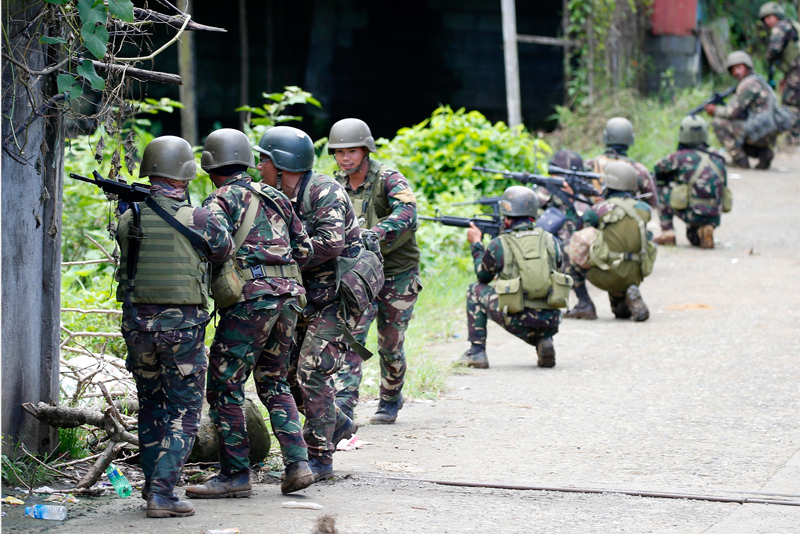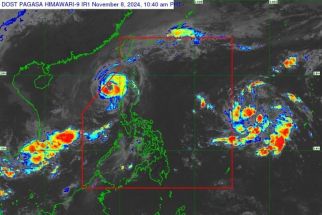Duterte claims drug money funding terrorism in Mindanao

Government troops take positions as they head to the frontline as fighting with Muslim militants in Marawi city enters its second week, Tuesday, May 30, 2017, in the southern Philippines. Philippine forces pressed their offensive to drive out militants linked to the Islamic State group after days of fighting left corpses in the streets and hundreds of civilians begging for rescue from a besieged southern city of Marawi. AP/Bullit Marquez
MANILA, Philippines — President Rodrigo Duterte claimed on Wednesday that drug money was used to finance both past and present terrorism activities in the Philippines, not so-called Islamic State of Iraq and Syria (ISIS) funding from the Middle East, as he admitted that the government had suffered “tremendous” losses in the clashes in Marawi City.
Speaking before military personnel from the Philippine Navy celebrating its 119th founding anniversary, Duterte said that so-called ISIS did not have much support to local Islamist groups as the government was able to stanch the supply of money from the Middle East.
The president said that drug money had been used to support terrorist activities in the Philippines, even claiming that Marawi City, the scene of deadly clashes that left 89 militants, 21 soldiers and 19 civilians dead, had turned into a center of methamphetamine, locally known as shabu, production.
“There was a time until now that the terrorism activities in the Philippines is funded and fueled by drug money. Alam namin na walang masyadong tulong ang ISIS sa Middle East. Nakukuha naming yung pinapadala nila by just examining papers,” the president said as he admitted that deaths were to be expected in any war, including the war on drugs.
He said that as Manila launched a deadly crackdown on illegal drugs many producers of illicit narcotics turned to terrorist groups for protection.
“And for all — lahat — Christians and the Moro, who were into shabu sought sanctuary amongst the terrorists for protection and to ensure the success of their business. So much so that even Manila was already flooded, and we have to put an apparatus to stop it,” he said.
The Philippine drug war has claimed between 7,000 to 9,000 lives, according to human rights groups and government critics. The Philippine National Police, however, disputes this and says that this number is inflated. It pegs the number of deaths related to the war on drugs at around 4,000.
The chief executive said that he had been warning about the threats of ISIS to the country and just last week admitted that ISIS had already arrived in the Philippines, contradicting what the Philippine military was saying at that time that there were no ISIS fighters in the country.
Duterte also admitted that the government had incurred “tremendous losses” in more than a week of fighting between security forces and Maute and Abu Sayyaf fighters in Marawi City. He said that this was expected considering that the soldiers were the “invading force” and the militants had already set up their defenses.
“And in Marawi now, I’m sad to tell you that we have suffered tremendous losses. Because we are the invading force, and they have been set up there for a long time waiting for the soldiers of the republic to come,” he said.
The chief executive also said that the Philippine government was able to cut the supply of support from the Middle East.
He said one of the recipients of the funding was Superintendent Maria Cristina Nobleza, the former deputy regional director of the PNP crime laboratory in Davao City, who was caught after she allegedly tried to help one Abu Sayyaf fighter in Bohol escape. The president said that Nobleza was an active player in the terrorism business of the group.
PNP Director General Ronald Dela Rosa said at that time that Nobleza was caught “sleeping with the enemy.”
“And one of those who was the recipient of a huge amount is a member of the Philippine National Police. Yung si Nobleza. She was not only in cahoots, but she was an active player in the terrorism business. She was the one who was apprehended in Bohol when she tried to extricate the remaining Abu Sayyaf who were on the run at the time,” the chief executive said.
The president said that the “nonchalant” attitude of Filipinos was partly to blame for the terrorist problems in Mindanao and in other parts of the country.
“This is my take. Hinayaan kasi natin ang droga,” he said.
Duterte placed Mindanao under martial law Tuesday last week following the foiled attempt of Philippine security forces to arrest Isnilon Hapilon, a subleader of the notorious Abu Sayyaf, and other leaders of the Maute group of bandits.
Clashes ensued between the two groups as the Islamist militants holed themselves up in parts of the city, leading to street-to-street combats.
- Latest
- Trending































